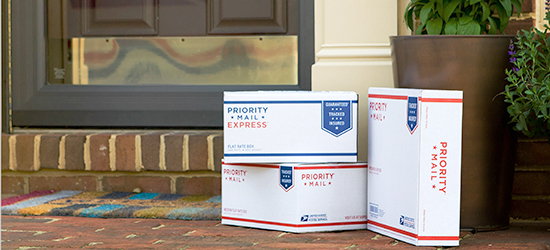Share this
A Brief Guide to Ecommerce Shipping
by Rin Mosher on Jan. 22, 2024

As more and more consumers turn to online shopping, ecommerce shipping has become increasingly important for businesses of all kinds. A smooth and reliable shipping process can greatly impact customer satisfaction and loyalty, not to mention make a big difference in operational efficiency. In this article, we will discuss the responsibilities of ecommerce shipping and provide tips you can use to optimize your own.
Ecommerce Shipping Explained
Ecommerce shipping is the process of transporting products purchased online from a seller to a buyer. It plays an integral role in supply chain management for ecommerce businesses, ensuring that products are delivered to customers in a timely and efficient manner.
What Ecommerce Shipping Involves
The term 'ecommerce shipping' encompasses a lot more than physically transporting a package from Point A to Point B. It's a multi-step process that requires involvement from multiple parties in order to work.
This includes:
- Receiving and processing orders
- Maintaining accurate and timely billing
- Ongoing monitoring of inventory status
- Picking and packing products
- Printing shipping labels
- Issuing updates to customers
- Managing returns
Types of Ecommerce Shipping and Fulfillment Solutions
Online businesses have multiple shipping options for ecommerce products. Each one comes with its own benefits and drawbacks, so it's important to fully understand the scope of your situation before making any decisions. Learn more about the three most common types of ecommerce fulfillment and shipping arrangements and what situations each option is best for below.
Self-Fulfillment
Self-fulfillment refers to a system in which a business handles inventory management, picking, packing, labeling, and courier handoff in-house. This guarantees end-to-end control over and visibility into the shipping process, but comes with several tradeoffs.
For one, you'll need to have enough time and resources for the job. Smaller businesses may not be able to commit enough of either for self-fulfillment to work. On top of that, there's the responsibility of arranging everything—from label printers and packing tape to shipping cost negotiations with carriers like FedEx, UPS, and DHL. If something goes wrong, it's on you and your business to find a solution.
Dropshipping
Dropshipping is an arrangement wherein an online store partners with a supplier or manufacturer to fulfill orders on their behalf. The business makes the sale, and then ships the order details over to their partner who handles picking, packing, labeling, and shipping. This eliminates inventory management from the equation, as well as any need for a warehouse or physical storage space.
Dropshipping is an attractive option for smaller businesses that don't have the resources to manage their own fulfillment process. However, there are some caveats. Because nearly everything is taken care of by an external partner - usually a mass supplier - there is limited control over product quality, inventory, and shipping timelines. These providers also charge high premiums for their help despite rarely offering personalized solutions.
Outsourcing to a 3PL Partner
Third-party logistics (3PL) companies offer businesses specialized ecommerce inventory management, order fulfillment, and shipping solutions. Using a network of warehouses and expert staff, they are equipped to handle a high volume of orders in a timely, accurate, and efficient manner. This is especially useful for businesses that have outgrown their current fulfillment capabilities or are experiencing a sudden surge in demand. 3PL providers also typically offer advanced software and tracking tools for businesses to monitor their inventory and order status in real time.
How to Establish an Ecommerce Shipping Process
An ecommerce business is only as viable as the system it has in place to process customer orders. Here are the key tasks you'll need to take on when establishing your order fulfillment process.
Arrange Packing/Shipping Boxes
Boxes are one of the most critical aspects of ecommerce shipping. They may seem simple, but everything from the size to the box design can impact the bottom line. You want to pick dimensions that are big enough to accommodate products without wasting space, as some carriers charge by dimensional weight.
Then there's the decision of whether to include dunnage, what packing tape to use, and exterior labeling. You also have the option to break the mold entirely with custom shipping boxes; these are a great way to make positive first impressions with customers but often come with extra complexity and cost.
In any case, it's important to take time to choose the right box for your ecommerce products. If you’re looking for a foolproof solution, consider working with a 3PL like Shipfusion. Outsourcing fulfillment to us means benefiting from technology-powered processes designed to maximize packing efficiency and minimize waste. Our advanced software can find the perfect box for every item in your inventory based on its unique size and weight.
Choose a Shipping Partner
The United States is home to several prominent shipping carriers, most notably FedEx, UPS, and USPS. As well-established companies, they know how to ship ecommerce products long distances with minimal friction, and are usually the safest option.
Final mile carriers must be selected as well; both large and local service providers can support the final mile and long-haul components of a shipping system. If you offer returns, be sure the ecommerce shipping and fulfillment partner you choose has an optimized reverse logistics and returns process in place.
Plan Shipping Timelines
Shipping timelines are crucial to ensuring a positive customer experience. That's why it's important to establish a clear and realistic timeframe for when orders will be processed, shipped, and delivered. This can vary based on the type of shipping service you offer (e.g. standard versus expedited), the destination of the package, and any potential delays that may occur.
It's also important to clearly communicate these timelines to your customers, both on your website and in order confirmation emails. This helps manage their expectations and avoid any disappointment or frustration if their package arrives later than expected.
Determine Shipping Costs
The cost of shipping products is a big element to consider when setting up a reliable and sustainable ecommerce order fulfillment system. You need to establish a baseline for how much you can expect to pay in shipping rates by looking at factors like average order volume, package size, product weight, and chosen service provider.
Billing can work in different ways, as well. If you are selling products that are similar in size and weight, flat rates might make the most sense. But for small businesses with products that vary greatly in size and weight, real-time rates may be more practical. This allows you to pass on any discounts or savings directly to your customers, building more brand loyalty.
Set Up Order Tracking
Package delivery notifications are no longer enough to satisfy online shoppers - they expect frequent, timely updates on their order status as it's being processed. This should ideally start at the very beginning of the fulfillment journey when items are gathered and packed in the warehouse. From there, customers like to know when the package has been handed off to the shipping carrier and when it's in transit.
There are a few different ways to implement order tracking, depending on your resources and capabilities. Some common options include integrating with popular carrier services (such as UPS or FedEx) for automatic tracking updates, using a tracking number from the carrier to create a link on your website for customers to check their order status, or setting up automated email alerts at specific stages of the fulfillment process.
Shipfusion's order management system will automatically update you and your customers on the status of each order, from when it's been picked and packed to when it's out for delivery.
Reliable shipping is crucial for the success of any ecommerce business. Customers expect their orders to arrive quickly and in perfect condition. Meanwhile, you need and deserve the peace of mind that comes with knowing your products are being handled and shipped with care.
Choosing the right shipping partner can make all the difference. With robust in-house technology and a team of dedicated staff, Shipfusion will make your ecommerce shipping experience seamless. Our flexible solutions enable us to tailor fulfillment strategies for businesses of all kinds.
Don't let shipping be the bottleneck in your growth - pick, pack, and ship better by reaching out to a Shipfusion fulfillment expert today.
Share this
You May Also Like
These Related Articles

Perks Of Custom eCommerce Shipping Boxes

Choosing Your Order Shipping Carrier: It’s All About Balance!

CBD eCommerce Fulfillment and Shipping Facts
- April 2024 (7)
- March 2024 (5)
- February 2024 (5)
- January 2024 (5)
- December 2023 (4)
- November 2023 (2)
- October 2023 (5)
- September 2023 (4)
- August 2023 (2)
- July 2023 (1)
- June 2023 (4)
- May 2023 (1)
- March 2023 (2)
- February 2023 (1)
- October 2022 (1)
- September 2022 (5)
- August 2022 (4)
- July 2022 (7)
- June 2022 (4)
- May 2022 (5)
- April 2022 (7)
- March 2022 (2)
- February 2022 (1)
- January 2022 (3)
- December 2021 (2)
- November 2021 (4)
- October 2021 (2)
- September 2021 (5)
- August 2021 (4)
- July 2021 (5)
- June 2021 (4)
- May 2021 (2)
- April 2021 (3)
- March 2021 (3)
- February 2021 (3)
- January 2021 (2)
- December 2020 (4)
- November 2020 (2)
- October 2020 (4)
- September 2020 (2)
- August 2020 (1)
- July 2020 (6)
- June 2020 (5)
- May 2020 (2)
- April 2020 (2)
- March 2020 (4)
- February 2020 (1)
- December 2019 (1)
- May 2018 (1)
- March 2018 (2)
- February 2018 (3)
- January 2018 (3)
- November 2017 (3)
- July 2017 (4)
- March 2017 (3)
- February 2017 (5)
- January 2017 (3)
- December 2016 (4)
- November 2016 (6)
- October 2016 (6)
- October 2015 (1)
- September 2015 (1)
- June 2015 (3)
- May 2015 (3)
- August 2014 (1)
- July 2014 (1)
- March 2014 (1)
- February 2014 (1)